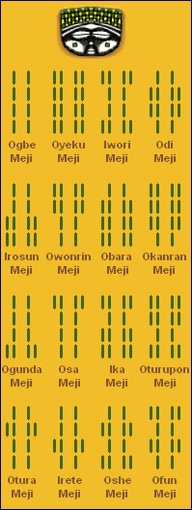 Submitted by Mojo on
Submitted by Mojo on

Yoruba, as a practice, a religion, a culture, and way of life, can be incredibly difficult to understand. Orunmila, a great prophet who lived approximately 5000 years ago in West Africa, taught the Yoruba people an advanced form of spiritual knowledge and ethics, known as the Odu.
The Odu is a collection of 256 verses, each with its own collection of knowledge and wisdom. Many priest use the Odu for divination purposes, for they believe that the practice bridges the gap between the spiritual and physical world. Divination is a process of seeing how the past affects the future. This concept is known in both the Eastern and Western world as karma.

In the Beginning, Olodumare (God) gave the Orisa Orunmila a flawless method of communication between himself and the Orisa called Ifa. Ifa is linked to destiny through the Ifa the true religion of Yorubas . Sixteen is the number of cosmos; it represents the primal order that issued from the unity of Olodumare.

Orunmila
(Sixteen is also a significant number in the world of computers.) When the world was first created, it spread out from an original palm tree that stood at the center of the world at Ile-Ife. The palm tree had sixteen branches, which formed the four cardinal points and the sixteen original quarters of Ile-Ife. In political terms, Odudua, the first oni of Ife, fathered sixteen sons who founded the sixteen original kingdoms of the Yoruba. On a deeper level still, Orunmila taught the art of divination to his sixteen sons; they, in turn, passed it down to the Babalawos who practice it today.
Through the linked concepts of order, creation, and destiny, the number sixteen represents the variables of the human condition, the sixteen possible situations of human life. For the Yoruba, the sixteen principle signs are called Odu or Olodu, from each of which are drawn sixteen subordinate signs (omo-Odu, "children of the odu" or Odus).
These represent the sixteen essential life situations with sixteen possible variations each. This means 256 possible combinations (Odu's) or two to the eighth power. Each Odu is a recital of a set of poems called ese, that provide clues for the resolution of the problem during a divination session. There are at least, and by far not the most, 16 different ese's for each of the 256 Odu. This adds up to at least 4096 different scenarios. The goal of the Babalawo is to arrive at the appropiate Odu for the situation of his "querent".
Each of the 256 Odu reveals an archetypal situation that was resolved in the mythic past through sacrifice to an Orisa. In the thousands of Ifa poems, the Orisa are organized into a community of spirits whose ase (power) can can be brought to bear on the problems of individual men and women in need.
In this way, Ifa and the Babalawo priesthood are responsible for directing the adherents of all the Orisa's by leading querents to them. Nearly all the sacrifice/ebo of Ifa/Yoruba religion are offered to the Orisa's as a result of divination. Ifa structures Orisa worship; the randomness of the system ensures that all the Orisa's are duly venerated. Through Ifa, the balance of the sacrificial relationship between heaven and earth is maintained, for Ifa, through Odu (word of God), provides human beings with information about their place in the world, their destiny, and what the God's require of them.

The 16 primordial odu - Of the 256 possible letters than can come in traditional Yoruba divination, these 16 are the most... archetypical. This alphabet for divination spread all over Africa and into Asia and then to Europe.
Many people use the word karma pretty loosely. Suffice it to say that karma is a process where we re-create our experiences until we learn from our mistakes and walk down the path that God has created for us. Many people fail to realize that we carry karma from previous lives. We also carry karma from our lineage and family ties. Priests who interpret the Odu or use the Odu for divinations are looking for particular patterns and or mistakes in past and present lives. Then, they are able to guide initiates and practioners down the right path to rectify a problem or reoccurring situation. The Odu acts as a tool or a religious script that morally guides people through life.
- 5694 reads